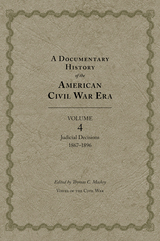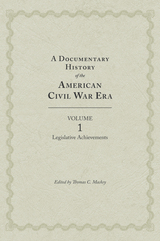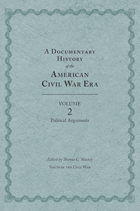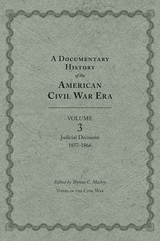4 books about American Civil War Era

A Documentary History of the American Civil War Era
Judicial Decisions, 1867–1896
Thomas C. Mackey
University of Tennessee Press, 2012
A Documentary History of the American Civil War Era is the first comprehensive collection
of public policy actions, political speeches, and judicial decisions related to the American
Civil War. Collectively, the four volumes in this series give scholars, teachers, and students
easy access to the full texts of the most important, fundamental documents as well as hardto-
find, rarely published primary sources on this critical period in U.S. history.
The first two volumes of the series, Legislative Achievements and Political Arguments,
were released last year. The final installment, Judicial Decisions, is divided into two volumes.
The first volume, spanning the years 1857 to 1866, was released last year. This second
volume of Judicial Decisions covers the years 1867 to 1896. Included here are some of
the classic judicial decisions of this time such as the 1869 decision in Texas v. White and
the first judicial interpretation of the 1868 Fourteenth Amendment, the 1873 Slaughter-
House Cases. Other decisions are well known to specialists but deserve wider readership
and discussion, such as the 1867 state and 1878 federal cases that upheld the separation of
the races in public accommodations (and thus constituted the common law of common
commerce) long before the more notorious 1896 case of Plessy v. Ferguson (also included).
These judicial voices constitute a lasting and often overlooked aspect of the age of Abraham
Lincoln. Mackey’s headnotes and introductory essays situate cases within their historical
context and trace their lasting significance. In contrast to decisions handed down
during the war, these judicial decisions lasted well past their immediate political and legal
moment and deserve continued scholarship and scrutiny.
This document collection presents the raw “stuff” of the Civil War era so that students,
scholars, and interested readers can measure and gauge how that generation met Lincoln’s
challenge to “think anew, and act anew.” A Documentary History of the American Civil
War Era is an essential acquisition for academic and public libraries in addition to being a
valuable resource for courses on the Civil War and Reconstruction, legal history, political
history, and nineteenth-century American history.
of public policy actions, political speeches, and judicial decisions related to the American
Civil War. Collectively, the four volumes in this series give scholars, teachers, and students
easy access to the full texts of the most important, fundamental documents as well as hardto-
find, rarely published primary sources on this critical period in U.S. history.
The first two volumes of the series, Legislative Achievements and Political Arguments,
were released last year. The final installment, Judicial Decisions, is divided into two volumes.
The first volume, spanning the years 1857 to 1866, was released last year. This second
volume of Judicial Decisions covers the years 1867 to 1896. Included here are some of
the classic judicial decisions of this time such as the 1869 decision in Texas v. White and
the first judicial interpretation of the 1868 Fourteenth Amendment, the 1873 Slaughter-
House Cases. Other decisions are well known to specialists but deserve wider readership
and discussion, such as the 1867 state and 1878 federal cases that upheld the separation of
the races in public accommodations (and thus constituted the common law of common
commerce) long before the more notorious 1896 case of Plessy v. Ferguson (also included).
These judicial voices constitute a lasting and often overlooked aspect of the age of Abraham
Lincoln. Mackey’s headnotes and introductory essays situate cases within their historical
context and trace their lasting significance. In contrast to decisions handed down
during the war, these judicial decisions lasted well past their immediate political and legal
moment and deserve continued scholarship and scrutiny.
This document collection presents the raw “stuff” of the Civil War era so that students,
scholars, and interested readers can measure and gauge how that generation met Lincoln’s
challenge to “think anew, and act anew.” A Documentary History of the American Civil
War Era is an essential acquisition for academic and public libraries in addition to being a
valuable resource for courses on the Civil War and Reconstruction, legal history, political
history, and nineteenth-century American history.
[more]

A Documentary History of the American Civil War Era
Volume 1, Legislative Achievements
Thomas C. Mackey
University of Tennessee Press, 2012
A Documentary History of the American Civil War Era is the first comprehensive collection of public policy actions, political speeches, and judicial decisions related to the American Civil War. This three-volume set gives scholars, teachers, and students easy access to the full texts of the most important, fundamental documents as well as hard-to-find, rarely published primary sources on this critical period in U.S. history.
The first volume of the series, Legislative Achievements, contains legislation passed in response to the turmoil seizing the country on the brink of, during, and in the wake of the Civil War. Forthcoming are volume 2, Political Arguments, which contains voices of politicians, political party platforms, and administrative speeches, and volume 3, Judicial Decisions, which provides judicial opinions and decisions as the Civil War raged in the courtrooms as well as on the battlefields.
Organized chronologically, each of the selections is preceded by an introductory headnote that explains the document’s historical significance and traces its lasting impact. These headnotes provide insight into not only law and public policy but also the broad sweep of issues that engaged Civil War–era America.
Legislative Achievements features some of the most momentous and enduring public policy documents from the time, beginning with the controversial September 15, 1850, Fugitive Slave Act and concluding with the June 18, 1878, Posse Comitatus Act. Both military and nonmilitary legislation constitute this part, including the April 19, 1861, proclamation by President Abraham Lincoln declaring a naval blockade on Southern ports and Confederate President Jefferson Davis’s proclamation authorizing blockade runners to attack Northern shipping, both issued on the same day. Nonmilitary legislation includes statutes affecting the postwar period, such as the 1862 Homestead Act, the Civil Rights Act of 1866, and all four of the Reconstruction Acts. Also in this section are the three constitutional amendments, the Habeas Corpus Acts of 1863 and 1867, the Freedman’s Bureau Acts of 1865 and 1866, and the 1867 Tenure of Office Act together with President Andrew Johnson’s message vetoing the Act.
A Documentary History of the American Civil War Era is an essential acquisition for academic and public libraries in addition to being a valuable resource for students of the Civil War and Reconstruction, legal history, public policy, and nineteenth-century American history.
THOMAS C. MACKEY is a professor of history at the University of Louisville and adjunct Professor of Law at Brandeis School of Law. He is the author of Pornography on Trial (2002) and Pursuing Johns (2005).
The first volume of the series, Legislative Achievements, contains legislation passed in response to the turmoil seizing the country on the brink of, during, and in the wake of the Civil War. Forthcoming are volume 2, Political Arguments, which contains voices of politicians, political party platforms, and administrative speeches, and volume 3, Judicial Decisions, which provides judicial opinions and decisions as the Civil War raged in the courtrooms as well as on the battlefields.
Organized chronologically, each of the selections is preceded by an introductory headnote that explains the document’s historical significance and traces its lasting impact. These headnotes provide insight into not only law and public policy but also the broad sweep of issues that engaged Civil War–era America.
Legislative Achievements features some of the most momentous and enduring public policy documents from the time, beginning with the controversial September 15, 1850, Fugitive Slave Act and concluding with the June 18, 1878, Posse Comitatus Act. Both military and nonmilitary legislation constitute this part, including the April 19, 1861, proclamation by President Abraham Lincoln declaring a naval blockade on Southern ports and Confederate President Jefferson Davis’s proclamation authorizing blockade runners to attack Northern shipping, both issued on the same day. Nonmilitary legislation includes statutes affecting the postwar period, such as the 1862 Homestead Act, the Civil Rights Act of 1866, and all four of the Reconstruction Acts. Also in this section are the three constitutional amendments, the Habeas Corpus Acts of 1863 and 1867, the Freedman’s Bureau Acts of 1865 and 1866, and the 1867 Tenure of Office Act together with President Andrew Johnson’s message vetoing the Act.
A Documentary History of the American Civil War Era is an essential acquisition for academic and public libraries in addition to being a valuable resource for students of the Civil War and Reconstruction, legal history, public policy, and nineteenth-century American history.
THOMAS C. MACKEY is a professor of history at the University of Louisville and adjunct Professor of Law at Brandeis School of Law. He is the author of Pornography on Trial (2002) and Pursuing Johns (2005).
[more]

A Documentary History of the American Civil War Era
Volume 2, Political Arguments
Thomas C. Mackey
University of Tennessee Press, 2013
A Documentary History of the American Civil War Era is the first comprehensive collection of public policy actions, political speeches, and judicial decisions related to the American Civil War. This three-volume set gives scholars and students easy access to the full texts of both the most important, fundamental documents as well as hard-to-find, rarely published primary sources on this critical period in U.S. history.
Volume 2 in the series, Political Arguments, presents the words of politicians, political party platforms, and administrative speeches. It is divided into two sections. The first, Voices of the Politicians and Political Parties, comprises the platforms of the major (and some minor) parties from1856 to 1876. Also included are such pieces as Robert E. Lee’s letter of resignation from the U.S. Army, a few key speeches by that rising politician from Illinois, Abraham Lincoln, and a letter on the “American Question” written by a European observer, Karl Marx. Other items include examples of the 1860–1861 state ordinances of secession and addresses on emancipation and Reconstruction by Jefferson Davis and by the Republican leader in the House of Representatives, Thaddeus Stevens.
Section two, Voices of the Administrations, contains records from the presidencies of James Buchanan, Abraham Lincoln, Andrew Johnson, Ulysses S. Grant, and Rutherford B. Hayes as well as a message from Confederate President Jefferson Davis telling his congress that the Southern cause was “just and holy.” Classic documents such as Lincoln’s announcement of forthcoming emancipation and the Emancipation Proclamation are here, as are lesser-known but important documents such as Francis Lieber’s 1863 revised law code for war, General Order 100, and Attorney General James Speed’s 1865 opinion supporting the Johnson administration’s decision to try the Lincoln murder conspirators by special military commission and not in the civilian courts.
Each of the selections in <i>Political Arguments<i> is preceded by editor Thomas Mackey’s introductory headnotes that explain the document’s historical significance and trace its lasting impact. These commentaries provide insight into not just law and public policy but also the broad sweep of issues important to Civil War– era Americans.
A Documentary History of the American Civil War Era is an essential acquisition for academic and public libraries in addition to being a valuable resource for courses on the War and Reconstruction, legal history, political history, and nineteenth- century American history.
Volume 2 in the series, Political Arguments, presents the words of politicians, political party platforms, and administrative speeches. It is divided into two sections. The first, Voices of the Politicians and Political Parties, comprises the platforms of the major (and some minor) parties from1856 to 1876. Also included are such pieces as Robert E. Lee’s letter of resignation from the U.S. Army, a few key speeches by that rising politician from Illinois, Abraham Lincoln, and a letter on the “American Question” written by a European observer, Karl Marx. Other items include examples of the 1860–1861 state ordinances of secession and addresses on emancipation and Reconstruction by Jefferson Davis and by the Republican leader in the House of Representatives, Thaddeus Stevens.
Section two, Voices of the Administrations, contains records from the presidencies of James Buchanan, Abraham Lincoln, Andrew Johnson, Ulysses S. Grant, and Rutherford B. Hayes as well as a message from Confederate President Jefferson Davis telling his congress that the Southern cause was “just and holy.” Classic documents such as Lincoln’s announcement of forthcoming emancipation and the Emancipation Proclamation are here, as are lesser-known but important documents such as Francis Lieber’s 1863 revised law code for war, General Order 100, and Attorney General James Speed’s 1865 opinion supporting the Johnson administration’s decision to try the Lincoln murder conspirators by special military commission and not in the civilian courts.
Each of the selections in <i>Political Arguments<i> is preceded by editor Thomas Mackey’s introductory headnotes that explain the document’s historical significance and trace its lasting impact. These commentaries provide insight into not just law and public policy but also the broad sweep of issues important to Civil War– era Americans.
A Documentary History of the American Civil War Era is an essential acquisition for academic and public libraries in addition to being a valuable resource for courses on the War and Reconstruction, legal history, political history, and nineteenth- century American history.
[more]

A Documentary History of the American Civil War Era
Volume 3, Judicial Decisions, 1857-1866
Thomas C. Mackey
University of Tennessee Press, 2014
A Documentary History of the American Civil War Era is the first comprehensive collection of public policy actions, political speeches, and judicial decisions related to the American Civil War. Collectively, the four volumes in this series give scholars, teachers, and students easy access to the full texts of the most important, fundamental documents as well as hard-to-find, rarely published primary sources on this critical period in U.S. history.
The first two volumes of the series, Legislative Achievements and Political Arguments, were released last year. The final installments, Judicial Decisions, is split into two volumes, with this one, volume 3, spanning from 1857 to 1866. It contains some of the classic judicial decisions of the time such as the 1857 decision in Dred Scott and the 1861 Ex parte Merryman decision. Other decisions are well known to specialists but deserve wider readership and discussion, such as the October 1859 Jefferson County, Virginia, indictment of John Brown and the decision in the 1864 case of political and seditious activity in Ex parte Vallandigham. These judicial voices constitute a lasting and often overlooked aspect of the age of Abraham Lincoln. Mackey’s headnotes and introductory essays situate cases within their historical context and trace their lasting significance. In contrast to the war, these judicial decisions lasted well past their immediate political and legal moment and deserve continued scholarship and scrutiny.
This document collection presents the raw “stuff” of the Civil War era so that students, scholars, and interested readers can measure and gauge how that generation met Lincoln’s challenge to “think anew, and act anew.” A Documentary History of the American Civil War Era is an essential acquisition for academic and public libraries in addition to being a valuable resource for courses on the Civil War and Reconstruction, legal history, political history, and nineteenth-century American history.
Thomas C. Mackey is a professor of history at the University of Louisville and adjunct Professor of Law at Brandeis School of Law. He is the author of Pornography on Trial and Pursuing Johns.
The first two volumes of the series, Legislative Achievements and Political Arguments, were released last year. The final installments, Judicial Decisions, is split into two volumes, with this one, volume 3, spanning from 1857 to 1866. It contains some of the classic judicial decisions of the time such as the 1857 decision in Dred Scott and the 1861 Ex parte Merryman decision. Other decisions are well known to specialists but deserve wider readership and discussion, such as the October 1859 Jefferson County, Virginia, indictment of John Brown and the decision in the 1864 case of political and seditious activity in Ex parte Vallandigham. These judicial voices constitute a lasting and often overlooked aspect of the age of Abraham Lincoln. Mackey’s headnotes and introductory essays situate cases within their historical context and trace their lasting significance. In contrast to the war, these judicial decisions lasted well past their immediate political and legal moment and deserve continued scholarship and scrutiny.
This document collection presents the raw “stuff” of the Civil War era so that students, scholars, and interested readers can measure and gauge how that generation met Lincoln’s challenge to “think anew, and act anew.” A Documentary History of the American Civil War Era is an essential acquisition for academic and public libraries in addition to being a valuable resource for courses on the Civil War and Reconstruction, legal history, political history, and nineteenth-century American history.
Thomas C. Mackey is a professor of history at the University of Louisville and adjunct Professor of Law at Brandeis School of Law. He is the author of Pornography on Trial and Pursuing Johns.
[more]
READERS
Browse our collection.
PUBLISHERS
See BiblioVault's publisher services.
STUDENT SERVICES
Files for college accessibility offices.
UChicago Accessibility Resources
home | accessibility | search | about | contact us
BiblioVault ® 2001 - 2024
The University of Chicago Press









